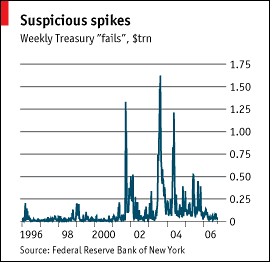
There is an article in the Economist this week discussing issues of concern to the Treasury. These concerns involve lending institutions from around the world which the U.S. is borrowing from. The treasury is concerned about the behavior of the banks we are borrowing from. This is largely due to the fact that banks can manipulate the market by restricting the supply of notes. One of the ways they do this is by "parking it with custodian banks." When there is less supply of the notes, banks can and often due profit by using them as collateral for loans. "They do this in the busy repurchase (repo) market, where treasuries are sold for cash with agreement to buy them back later. The scarcer the security you want to swap, the lower the interest rate you pay for the cash, known as the repo rate. On some issues this year the repo rate has fallen close to zero."
The treasury's concerns stem from the large amount of debt the U.S. currently carries. Increases in borrowing costs have more significant effects than ever before as a result. "Overnight money now costs 5.25% after 17 straight hikes." It is costing more and more to borrow which some banks believe it is justified in light of the 'risk' they are taking. Some however view this as “an exercise in monopoly pricing”. If a lendininstitutionon raises its interest rates, it is safe to assume many others have also taken that step or are taking that step at the same time; otherwise the lendininstitutionon would loose its customers.
The Treasury is very concerned with these movements because as mentioned before, "the market for its debt is the world's deepest and most liquid, with an average daily volume of $600 billion—many times more than America's share markets." Therefore behavior of banks is of enormous importance to the treasury, perhaps more than any other country in the world. It is also important to note that because the Fed implements monetary policy- it is expected to provide a "risk-free benchmark against which other credit is measured. If it is not squeaky clean, investors could turn tail, raising the country's borrowing costs."
Some argue that manipulating the market would be difficult because of its enormous size; consequently even a few adjustments should not have that big of an impact. Despite this the Treasury is still worried. Another concern is the "sharp increase in treasury settlement “fails” in the past few years, caused by a failure to return securities on time to the lender: these tend to jump when the repo rate is low and bonds are scarce."
There is also a concern of "history repeating itself" which is in "reference to the scandal at Salomon Brothers in the early 1990s, in which the investment bank was caught dodging rules on treasury auctions in order to gain control over certain issues". As a result, a joint surveillance program was introduced which says the Treasury, the FED and the SEC get together to "compare notes on the market". The Economist suggests that it's time for them to get tougher. It cites the recent downfall of profits for UBS which was caused by mistakes they made. "UBS which must now try to ensure that any bad smells at its bond-trading desk do not pollute other businesses, particularly its prized wealth-management arm. The bank delivered more bad news on October 31st, announcing a 21% drop in third-quarter profits. The cause was largely put down to poor trading: the bank admitted to, among other things, having been 'incorrectly positioned' in the treasury market." It is believed that if the Treasury, the FED and the SEC get tougher, there would be less suspicious increases in interest rates and problems like what UBS experienced would not occur because lending instituions would be more responsible.
No comments:
Post a Comment